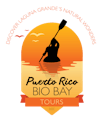About Puerto Rico Bio Bay Tours
Puerto Rico Bio Bay Tours LLC. owners and founders are a husband and wife team that for the last 20 years have worked together pushing daily to bring a professional, quality standard to our guests and clients, working toward our goal of a “Fun, Safe, and Memorable Experience every time!” Pushing to become known for our concern for the environment and implementation of laws that will help protect it.
Michael S. Grasso Jr. President & CEO, he is a key player on the Puerto Rico Bio Bay Tours team, his ability to develop, create and bring to life all points of field operations is his passion! Creating and building all Bio Bay tours from the paper to legal operating adventures, he has earned the nickname of “Drill Sergeant” for his unwillingness to overlook the smallest of details. Nilsa Montanez our Secretary and Treasurer and the heart of the business is the office administrator. She oversees all office related matters and keeps the day to day operations in line along with one of the most important tasks of keeping bookings and reservations organized and timely.
At the end of the day, our most important asset is our guests and that we have met our promise to give them a “Fun, Safe, Memorable Experience every time!” We are proud to promote Puerto Rico and its natural and cultural wonders! As the owners we are but only a small part of the Puerto Rico Bio Bay Tours team, our guides are the true front line of our tours.





Outdoor Ethics
Puerto Rico Bio Bay Tours LLC. is passionate about the outdoors, nature, flora, fauna, history, culture, and the wild areas that allow us the opportunity as interpretive guides to teach and share the secrets that are held within these delicate wonders of nature!
One of our greatest gifts is the ability to bring guests into wild locations and during a short window of time, spark interest in new and trending outdoor ethics! Much of this is done by example, as outfitter and custodians of the environments we work in, we practice Leave No Trace. Setting up our Puerto Rico tours with endless forethought as to leave the natural area as we found it or better, bringing only the needed things in with us and make sure we bring them all back out!
We hope to spark your interest in Leave No Trace and the outdoor ethics that will expand your knowledge allowing you to understand that it does take responsible acts and planning to keep our natural wonders pristine and intact for many others to enjoy and generations upon generations to experience!
Become Involved – Become a Member – Volunteer


The Leave No Trace Seven Principles:
Plan Ahead and Prepare:
- Know the regulations and special concerns for the area you’ll visit.
- Prepare for extreme weather, hazards, and emergencies.
- Schedule your trip to avoid times of high use.
- Visit in small groups when possible. Consider splitting larger groups into smaller groups.
- Repackage food to minimize waste.
- Use a map and compass to eliminate the use of marking paint, rock cairns or flagging.

Travel and Camp on Durable Surfaces:
- Durable surfaces include established trails and campsites, rock, gravel, dry grasses or snow.
- Protect riparian areas by camping at least 200 feet from lakes and streams.
- Good campsites are found, not made. Altering a site is not necessary.
- In popular areas:
- Concentrate use on existing trails and campsites.
- Walk single file in the middle of the trail, even when wet or muddy.
- Keep campsites small. Focus activity in areas where vegetation is absent.
- In pristine areas:
Dispose of Waste Properly:
- Pack it in, pack it out. Inspect your campsite and rest areas for trash or spilled foods. Pack out all trash, leftover food and litter.
- Deposit solid human waste in catholes dug 6 to 8 inches deep, at least 200 feet from water, camp, and trails. Cover and disguise the cathole when finished.
- Pack out toilet paper and hygiene products.
- To wash yourself or your dishes, carry water 200 feet away from streams or lakes and use small amounts of biodegradable soap. Scatter strained dishwater.
Leave What You Find:
- Preserve the past: examine, but do not touch cultural or historic structures and artifacts.
- Leave rocks, plants and other natural objects as you find them.
- Avoid introducing or transporting non-native species.
- Do not build structures, furniture, or dig trenches.

Minimize Campfire Impacts:
- Campfires can cause lasting impacts to the backcountry. Use a lightweight stove for cooking and enjoy a candle lantern for light.
- Where fires are permitted, use established fire rings, fire pans, or mound fires.
- Keep fires small. Only use sticks from the ground that can be broken by hand.
- Burn all wood and coals to ash, put out campfires completely, then scatter cool ashes.
Respect Wildlife:
- Observe wildlife from a distance. Do not follow or approach them.
- Never feed animals. Feeding wildlife damages their health alters natural behaviors and exposes them to predators and other dangers.
- Protect wildlife and your food by storing rations and trash securely.
- Control pets at all times, or leave them at home.
- Avoid wildlife during sensitive times: mating, nesting, raising young, or winter.
Be Considerate of Other Visitors:
- Respect other visitors and protect the quality of their experience.
- Be courteous. Yield to other users on the trail.
- Step to the downhill side of the trail when encountering pack stock.
- Take breaks and camp away from trails and other visitors.
- Let nature’s sounds prevail. Avoid loud voices and noises.
Follow Leave No Trace on Facebook! Learn about upcoming events, courses and much more. Every Day is a New Day, Life is Full of Wonders, Time Never Stops, Learning should be a Lifetime!



